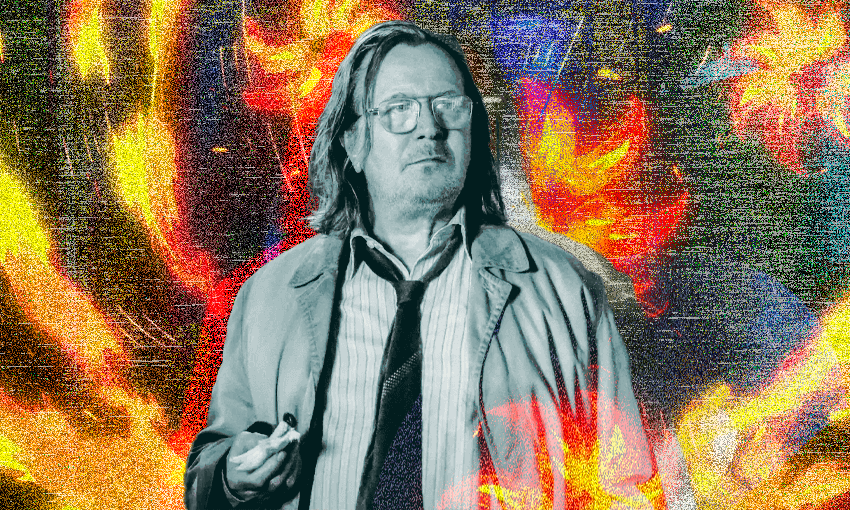Apple TV’s masterful spy thriller was the perfect antidote to high octane, low plausibility cop shows. Then it abruptly became one.
Warning: Mild spoilers for the first three seasons of Slow Horses.
It takes until episode three of the first season of Slow Horses for anyone to die. Even then, it’s essentially a blunder – the man responsible for the body looks more mortified than relieved when his assailant winds up dead. It’s not like the first episodes are devoid of action – there’s a kidnapping, and a non-fatal shooting. But it tells you a lot about the show that death does not so much stalk the show’s first half as wander about aimlessly, as if drunk and lost.
That’s precisely the show’s charm, and a very intentional one. Slow Horses is set in Slough House, a dilapidated and dark purgatory office for London MI5 agents who have fallen or failed. It stars Gary Oldman, in a bravura performance, as Jackson Lamb, the hard-drinking, harder-smoking, hardest-farting head of the bureau, who treats his charges with unconcealed contempt. His much younger minions are all damaged too, but still carry a faint hope that they might recover their dignity and return to the top flight.
The first season has the urgency the genre requires – an abduction with major geopolitical implications which spirals into chaos. But what makes it so singular and intriguing is everything it’s not. The show is all dingy interiors and coal dark night, the characters driven by distinctly human foibles, rather than heroic impulses. They are not all hot, and the ones who are manage to at least be properly messed up. In short, it makes even a spy drama as brilliant as The Americans look like it glamorises a profession that is, per le Carré and Slow Horses’ author Mick Herron, generally a dirty, confusing business.
Season two starts without major disruption to the programme. This time the plot concerns Russian sleeper agents known as cicadas, due to their potential to awaken after decades. Long dismissed as Kremlin misdirection, a credible source suggests they might have existed after all, and be responsible for significant operations on UK soil. For the first four episodes, the only noticeable tone shift is that London goes from murky and damp to bathed in brilliant sunshine and filled with jaw dropping architecture. This is in part due to a recent concerted effort to use film and TV to create jobs and attract tourists (sound familiar?).
Still, it doesn’t impact the integrity or direction of the show in any major way. At least until episode five, when it becomes something entirely different again. There’s a lengthy chase scene, involving multiple planes. There’s a lengthy stand-off with Russian gangsters, atop a skyscraper. There’s a murder in an oligarch’s mansion, and a brutal fight scene on a train.
Suddenly all those misfit characters, once so weird and charming, start to resemble the kind of hyper-stylised archetypes who crack the case every single week on SVU or Criminal Minds. Still, it’s not enough to break the wheel. The writing is great, the performances better, the plotting and post-Cold War intrigue still carries it along well above the typical boilerplate.
Then season three comes along, and that trend deviation established toward the end of season two steepens and goes vertical. There’s another kidnapping, this one much more nonsensical than the first. Every plot point exists on a spectrum between outlandish and impossible, and the characters descend into farcical caricature.
It heads toward end game: two whole episodes which are pure video game maximalism. And not the kind of penetrative, brooding notes which made The Last of Us so powerful last year. This is a heist from Grand Theft Auto or just plain Fortnite – relentless cartoon violence. By the end it bears no resemblance at all to the singular and subtle show we saw early on.
For all that, it’s not bad exactly. It’s not quite as thrilling and knowingly absurd as prime Jed Mercurio (The Bodyguard, Line of Duty), but that’s clearly what they’ve pivoted to and are aiming for. Apple has only a smattering of hits, and could really do with something in this space – a trailer for season four plays at the end of season three, showing just how committed they are to the franchise. I’m going to keep watching, because even sub-Mercurio is very watchable.
Still, it’s hard not to mourn what it was when considering what it has become. That first season of Slow Horses is a marvel of restraint and true originality. There was so much more that could have been done in that strange world. It would likely have stayed a critical hit while being commercially indifferent and been cancelled after three seasons – but I can’t help but wish they’d stayed the course instead of completing one of TV’s biggest and most vertiginous tone shifts.



